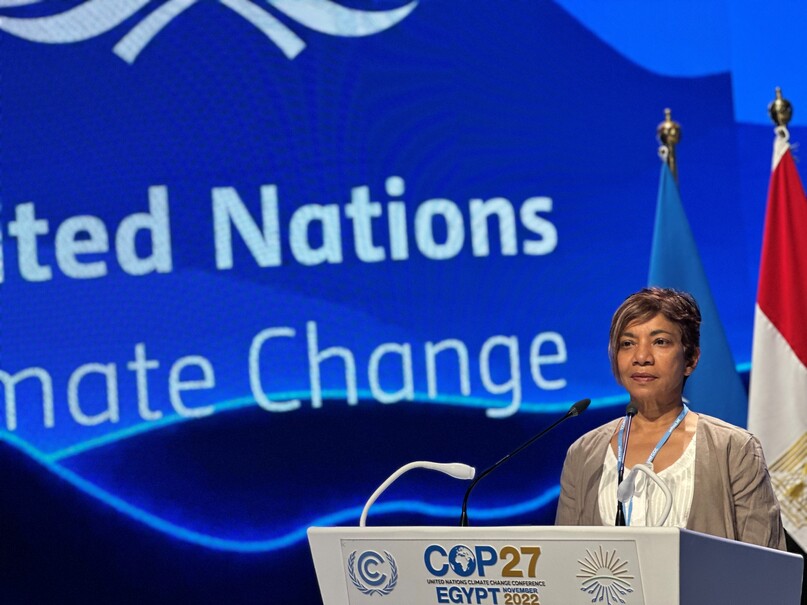Tropical forests vital for combating climate change—ITTO Executive Director delivers message at UN Climate Change
18 November 2022

ITTO Executive Director Sheam Satkuru delivers a statement at a high-level segment at the 27th Conference of the Parties to the UN Framework Convention on Climate Change. Photo: S. Kawaguchi/ITTO
Sharm El-Sheik, Egypt, 18 November 2022: Tropical forests are a valuable carbon reservoir at the core of climate-change adaptation and mitigation and their conservation is crucial for fighting climate change, according to ITTO Executive Director Sheam Satkuru, speaking this week at a high-level segment at the 27th Conference of the Parties to the UN Framework Convention on Climate Change and at several other events.
The high-level segment featured national statements from heads of state and government, as well as vice presidents, deputy prime ministers, ministers and heads of delegations and observer organizations. ITTO is an observer organization.
In her statement, Ms Satkuru said tropical forests present a paradox in which they are both a cause of, and a solution to, climate change.
“Emissions from the degradation and loss of tropical forests have long been identified as a major cause of climate change,” she said. “Paradoxically, however, these forests also have the strongest potential to mitigate the problem through carbon sequestration on a massive scale and to create highly useful wood and other assets in the process.”
Ms Satkuru said nature-based solutions are gaining traction as means for building greener societies.
“Sustainable forest management is one such solution because it generates legally and sustainably produced wood—the most environment friendly construction material—and many other products and services,” she said.
“Tropical forestry that benefits people and nature is important for sustainable development, enabling recovery from the COVID-19 pandemic, and combating the global environmental crisis of climate change, biodiversity loss and pollution.”
Ms Satkuru also spoke at other events at COP27 this week.
At the side-event, “Collaborative Partnerships on Land and Forest Fire Management in Dealing with Climate Change Issue”, held in the Indonesian Pavilion, Ms Satkuru said fire is one of the most significant sources of greenhouse-gas emissions in tropical forests and therefore applying integrated fire management in the tropics is urgent. She described two ITTO projects, funded by the Government of Japan, aimed at improving forest fire management in Indonesia and Peru.
The “Two Leaders’ Dialogue on Global Climate-friendly Forest Policy”, held in the ICC Pavilion on Tuesday, featured Ms Satkuru and Mairi McAllan, Scotland’s Minister for the Environment. During the dialogue, Ms Satkuru talked about how sustainable tropical forest management can add value to biodiversity, climate change, and livelihoods. She advocated more focus on sustainable consumption and increased attention on tropical forests as a climate-change solution.
At the side-event, “How Increasing Forest Cover Helps for Climate-change Adaptation”, held in the Panama Pavilion, Ms Satkuru stressed the effectiveness of tropical forests in mitigating climate change. She said using tropical timber as a substitute for non-renewable materials can help reduce greenhouse-gas emissions and store carbon, potentially for centuries. Noting recent debate on a circular economy, she said it was an important concept that was yet to gain traction in the tropics.
Ms Satkuru also participated in the side-event, “The potential of REDD+ as a Cooperative Approach and the Need for Capacity Building”, convened jointly by ITTO, the Korea Forest Service and Soka Gakkai. Among other things, this side-event explored Japan’s Joint Crediting Mechanism as a pioneering mechanism under Article 6 of the Paris Agreement and a model for other countries. It also presented a successful ITTO project in Togo, funded by Soka Gakkai, that empowered a group of 100 women to restore degraded land.
During a high-level dialogue held as part of the side-event, “Turning the Tide on Deforestation”, convened by Collaborative Partnership on Forests, Ms Satkuru said that, although forests had been given insufficient prominence at COP27, sustainably managed tropical forests are part of the solution to climate change.
“Tropical forests have the potential to absorb up to four gigatonnes of carbon per annum, making them an ideal nature-based solution,” she said. “In addition, tropical forests are a source of livelihoods for the rural poor and provide many other ecosystem services, such as clean air and water.”
Sustainable forest management requires long-term commitment from all stakeholders and substantially increased funding to unlock its potential, Ms Satkuru told the audience.
Recordings of the side-event are available here.


